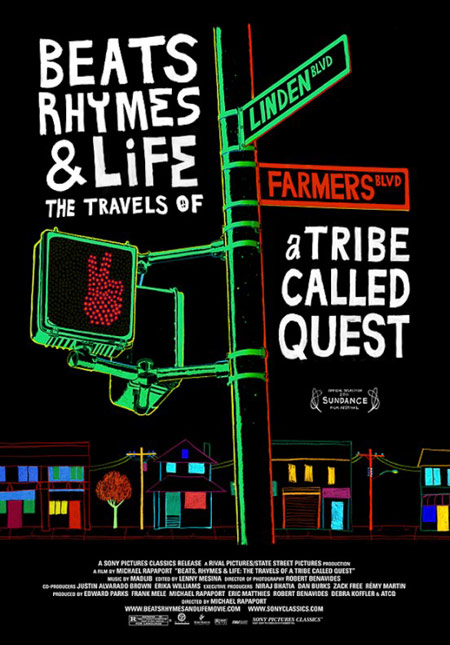
The Travels of A Tribe Called Quest
Sony Pictures Classic
By rock standards, five albums in 10 years is nothing remarkable, but in the ephemeral world of hip-hop, where the only constant seems to be low-slung jeans, such a catalog and span of time being relevant amounts to a lengthy career. For most of the ’90s, A Tribe Called Quest made their own rules, and against all odds were not only artistically innovative, but immensely popular, with the groundbreaking creativity of records like The Low End Theory and Midnight Marauders surpassed only by album sales. The Tribe eschewed the braggadocio of the times for jazz samples and laidback rhymes and even blatantly criticized the music industry, but managed to wrack up as much popularity as artistic credibility.
The group’s story is remarkable but not entirely unusual: Quest formed while the members were still in high school, and along with fellow Native Tongues like the Jungle Brothers and De La Soul, rose to prominence in the early ’90s as an intelligent alternative to thuggish trends in hip-hop. With their creative sparks waning along with their album sales, the group had seemingly run its course and they called it a day in 1998. With little drama surrounding the group, A Tribe Called Quest would seem an unlikely subject for a feature-length documentary.
While there’s no disputing the Tribe’s influence and importance, I’m still not convinced Beats, Rhymes & Life: The Travels of A Tribe Called Quest needed making after watching the documentary. Directed by Michael Rapaport and recently released on DVD, Beats is the filmic equivalent of an oral history, with the group’s story largely told through interviews with the Tribe members and their associates, friends and families. There’s intermittent video footage where appropriate, but Rapaport largely relies on Q-Tip, Phife Dawg, Ali Shaheed Muhammad and Jarobi to tell their own story.
And though that story is vaguely interesting, there isn’t enough tension or narrative arc to make the A Tribe Called Quest biography anything more than a segment in a VH1 hip-hip history lesson. While Phife and Q-Tip had some problems getting along, such conflicts seem no greater than what one would expect any lifelong friends to have from time to time. There’s an argument with the suits at the Tribe’s record label, Jive, that is mentioned, but it is glazed over in favor of playing up whatever riff there was between Q-Tip and Phife as leading to the group’s dissolution. This is further emphasized by an unresolved argument during their 2008 reunion.
By the end of the movie, it seems like everyone is friends enough again to go off to Japan to make a bundle of cash. As such, I’m not even sure what the point of the film is. It’s not a rags-to-riches story. It’s not a tragedy, nor a tale of a group who never got their due. It isn’t even a simple feel-good biopic. Instead, Beats just presents a simple truth: that A Tribe Called Quest was one of the greatest hip-hop acts to ever lay rhymes atop a beat. But we already knew that.
Stephen Slaybaugh
The Karaoke Singer's Guide to Self-Defense
Are We Still Rolling?
Orchestral Manoeuvres in the Dark Live Review
The Raincoats Live Review
!!! Live Review
1991: The Year Punk Broke
September Festival Guide
The Jesus Lizard, Club
Retromania
Paul McCartney and The Kills Live Reviews
Mid-Summer Festival Guide
Tedeschi Trucks Band Live Review
Wild Nothing and Twin Sister Live Review
Fungi Girls Live Review
